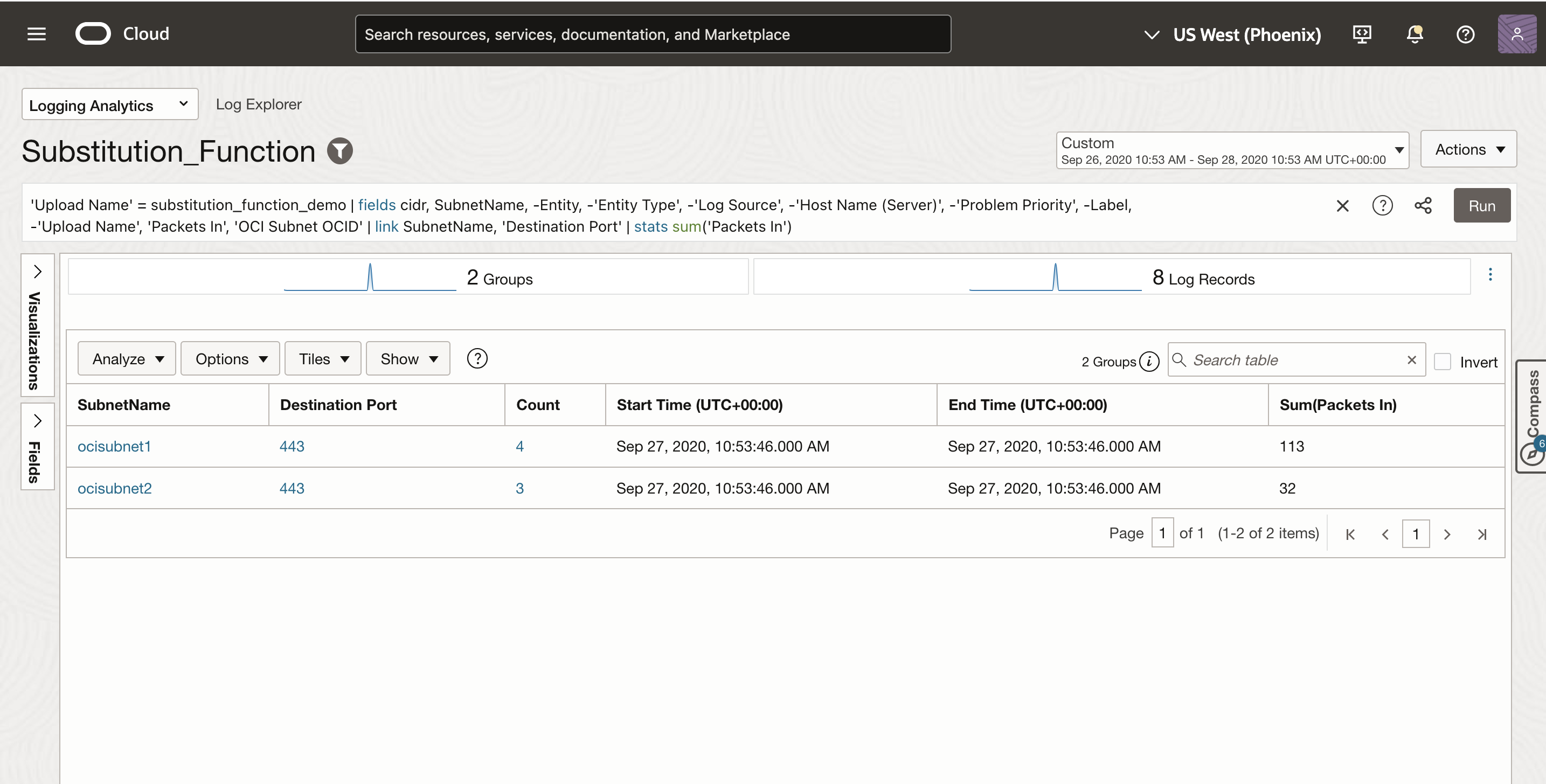In the complex landscape of enterprise technology, the ability to derive actionable insights from log data is a game-changer for businesses across industries. OCI Logging Analytics (LA), with its robust Substitution function, empowers organizations to transform raw log data into valuable intelligence, driving innovation and enabling efficient business operations.
Revolutionizing Log Data Enhancement
The Substitution function is an essential tool for any enterprise aiming to unlock the full potential of their log data. By dynamically modifying field values, it allows businesses to tailor their data to specific use cases, ensuring data privacy, compliance, and improved readability. This process is particularly beneficial for organizations dealing with sensitive information or those seeking to derive meaningful patterns from their logs.
Exploring how the Logging Analytics Substitution function is making a significant difference across various sectors:
1. Data Privacy in Retail & E-commerce: In the world of online retail, customer privacy is paramount. The Substitution function allows retailers to replace session IDs with anonymized values, ensuring that customer behavior analysis is conducted ethically. This approach maintains the integrity of data insights while respecting user privacy.
2. Cybersecurity Fortification: For cybersecurity professionals, masking critical information is essential. The function can be employed to replace IP addresses, authentication tokens, and usernames with placeholders, preventing potential security breaches. This technique enables thorough log analysis without exposing sensitive network details.
3. Financial Compliance: In the finance sector, compliance with regulations is non-negotiable. By substituting account numbers and credit card details with standardized placeholders, Oracle’s Logging Analytics ensures that financial institutions can analyze transaction patterns while adhering to data security standards.
4. HIPAA Compliance in Healthcare: Patient data confidentiality is a top priority in healthcare. The Substitution function anonymizes patient names and medical records, allowing healthcare providers to conduct trend analyses and improve services while maintaining HIPAA compliance.
5. Location Intelligence in Logistics: Logistics companies can enhance their operations by converting GPS coordinates into recognizable location identifiers. This transformation enables better route optimization, fleet management, and real-time tracking, ultimately improving customer satisfaction.
6. Industrial IoT and Error Resolution: Manufacturing plants and Industrial IoT setups often deal with complex error codes. The Substitution function translates these codes into understandable descriptions, facilitating quicker issue identification and resolution, and minimizing downtime.
7. Operational Efficiency in Oil & Gas: Standardization is key to efficient operations. In the oil and gas industry, normalizing site codes using the Substitution function provides a unified view of operations, enabling better decision-making and resource allocation.
8. Education and Remote Learning Security: With the rise of remote learning, IP address substitution with region-based identifiers ensures student privacy while allowing educational institutions to analyze network usage patterns and optimize their digital infrastructure.
A Real-World Cloud Networking Example
Oracle Cloud Infrastructure Logging Analytics (Logging Analytics) showcases its prowess in cloud networking. When dealing with Virtual Cloud Networks (VCNs), the challenge lies in extracting meaningful insights from Subnet OCIDs. Here’s how Logging Analytics steps in:
- Log Processing: It seamlessly ingests logs from various sources, including custom-defined ones, ensuring comprehensive data collection.
- Lookup Efficiency: By precomputing and storing Subnet OCID-to-CIDR mappings, the Lookup feature eliminates the need for complex calculations, significantly speeding up CIDR retrieval.
- Substitution in Action: Utilizing regex-based substitution, Logging Analytics extracts Subnet OCIDs, retrieves corresponding CIDR data, and replaces it with subnet details. This automated process enriches log data, making it more structured and actionable.
This use case highlights how Oracle’s Logging Analytics, with its Substitution function, simplifies complex log processing, enabling businesses to make data-driven decisions with ease.
Relating Packet Counts to Subnet Names for Network Traffic Analysis
Visualize total packet count for a specific subnet name extracted via the substitution function for easier analysis.

This post demonstrates how Oracle Cloud Logging Analytics leverages the Substitution Function to extract Subnet OCIDs, perform a CIDR lookup, replace them with subnet names, store the results in a new field, and apply this data to logs. This enables grouping packet counts by subnet name, enhancing security and providing deeper network insights.
Embrace the Power of Substitution
As businesses navigate the digital realm, the ability to manipulate and enhance log data is a competitive advantage. Oracle’s Logging Analytics Substitution function provides the means to unlock hidden insights, ensure compliance, and drive innovation. By understanding and implementing this powerful feature, enterprises can stay ahead of the curve in their respective industries.
The Substitution function is not just a tool but a strategic asset, enabling organizations to harness the true potential of their log data. Embrace the power of transformation and take your business to new heights with Oracle’s Logging Analytics. Start your free trial of OCI.
Resources
- Logging Analytics Log Parsing
- Logging Analytics Field Enrichment in Sources
- Logging Analytics Field Enrichment with Substitution Function
- Logging Analytics Blogs
- Logging Analytics Videos
